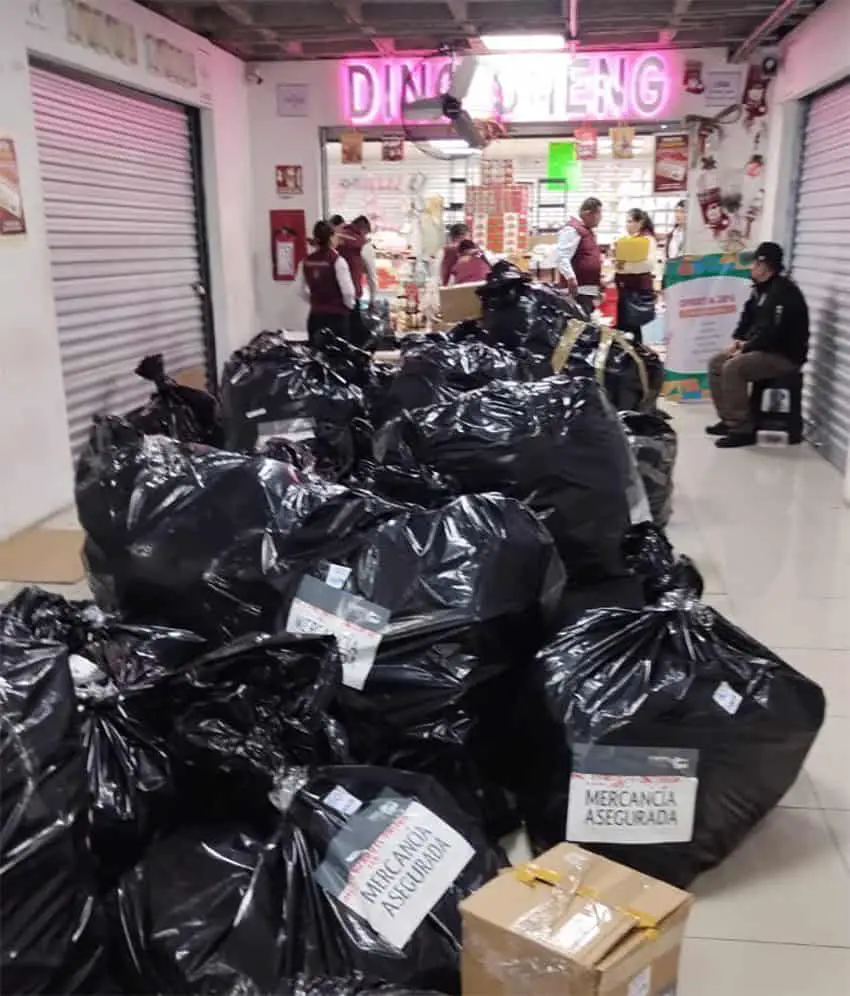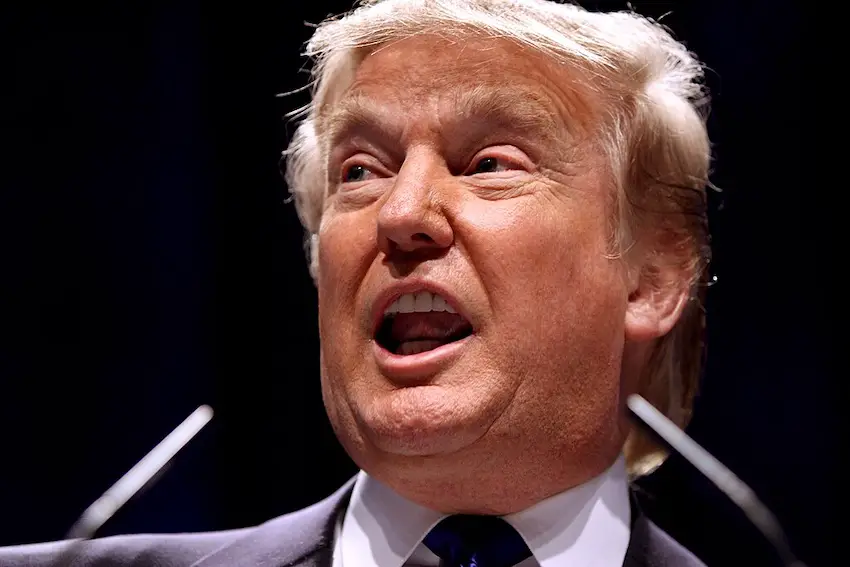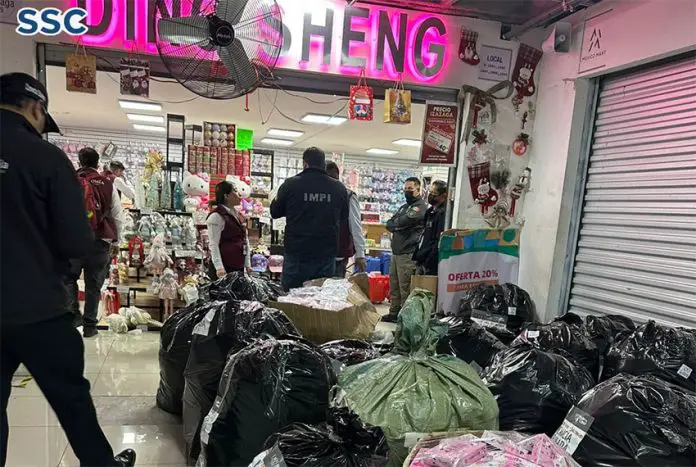As Mexico faces pressure from Donald Trump and others over its trade relationship with China and Chinese investment in various sectors of the Mexican economy, federal and Mexico City authorities raided a Chinese goods megastore on Thursday, seizing more than 200,000 counterfeit products.
The Economy Ministry (SE) and the Mexican Institute of Industrial Property (IMPI) led the operation targeting Mexico Mart, a 16-story Chinese-operated macroplaza (large wholesale shopping complex) in the historic center of Mexico City.
IMPI inspectors, navy personnel, Mexico City police officers and foreign trade officials participated in the operation, according to a joint statement issued by the SE and IMPI.
“Within the framework of the strategy to combat goods that are brought into the country and distributed illegally, the Economy Ministry and the Mexican Institute of Industrial Property today carried out an operation in a commercial plaza located at Izazaga Street 89 in the center of Mexico City,” the statement said, adding that “illicit goods” that violate the Federal Industrial Property Protection Law were confiscated.
The SE and IMPI said that around 90,000 counterfeit products “of Asian origin” had been seized by 3 p.m.
Mexico City Security Minister Pablo Vázquez Camacho said on social media shortly before 11 p.m. Thursday that more than 260,000 counterfeit products were confiscated.
Por instrucciones de la Jefa de Gobierno, @ClaraBrugadaM, compañeros de @SSC_CDMX, en coordinación con @SEMAR_mx, apoyaron en la seguridad perimetral y operativa para que representantes de @SE_mx e @IMPI_Mexico dieran cumplimiento a una diligencia para decomisar mercancía ilegal… pic.twitter.com/V1oPPbmBkq
— Pablo Vázquez Camacho (@PabloVazC) November 29, 2024
Fake Disney, Marvel, Nintendo and Sanrio (Hello Kitty) products were among those seized, the SE said. The contraband included t-shirts, toys, towels, pillows and make-up.
Vázquez posted video footage and photographs showing large trash bags filled with the phony products.
Economy Minister Marcelo Ebrard also posted a photograph of bags filled with seized goods. He said that the raid was carried out on the instructions of President Claudia Sheinbaum and that the fake goods would be destroyed.
The Economy Ministry said that the raid at Mexico Mart is “the first of various operations” it will carry out across Mexico in coordination with the navy, the National Guard, consumer protection agency Profeco, IMPI, federal tax agency SAT and state and municipal governments.

The SE said that the aim of the operations is to protect the Mexican “textiles and toy industries, among others” and to “eradicate illicit practices that affect the public and the national economy.”
IMPI chief Santiago Nieto said after Thursday’s raid that he believed the goods seized at Mexico Mart only represented “the tip of the iceberg” with regard to the sale in Mexico of counterfeit Chinese goods.
The Economy Ministry said it will seek to confiscate all products from Mexico Mart due to its “recurrence” of the “illegal practice” of selling counterfeit goods, and it appears likely that the business will be shut down permanently.
The macroplaza has been shut down on previous occasions, including in July when it came under investigation for selling contraband and failing to pay import fees. Mexico Mart — also known as Plaza Izazaga — reopened in August.
Nieto told Milenio Television on Thursday that Mexico Mart is also under investigation for tax evasion and money laundering. In a report published in June, the Reforma newspaper identified the owner of the market as Jin Lan, a businessman from the Chinese province of Zhejiang. Reforma said that he has seen his revenue “grow like foam,” or very quickly.
There are various other Chinese-operated wholesale complexes in the historic center of Mexico City. The proliferation of those establishments as well as the conversion of scores of buildings into warehouses to store Chinese goods has changed the face of the capital’s downtown and angered the owners of some long-established businesses.
The broader context of the raid
The raid on Thursday came as Mexico faces international pressure over its trade relationship with China and current and planned Chinese investment in various sectors of the Mexican economy including auto parts, vehicle production, pharmaceuticals and machinery manufacturing.
President-elect Donald Trump is particularly concerned about Chinese automakers’ plans to open plants in Mexico, although President Sheinbaum said Thursday that “there is not yet any firm investment project from any Chinese automotive company.”
Trump has threatened to impose hefty tariffs on all cars made in Mexico, while earlier this week he pledged to impose a 25% tariff on all Mexican and Canadian exports to the United States on the first day of his second term as U.S. president due to what he described as the “long simmering problem” of drugs and “illegal aliens” entering the U.S.

Precursor chemicals used to make fentanyl are illegally imported to Mexico from China, according to U.S. and Mexican authorities.
Last month, Trump accused Mexico as being a transshipment hub for Chinese goods, and asserted that he would “seek strong new protections against transshipment” in the USMCA “so that China and other countries cannot smuggle their products and auto parts into the United States tax free through Mexico to the detriment of our workers and our supply chains.”
Mexico has also faced criticism from some Canadian politicians for allowing what they see as unfettered Chinese investment in Mexico and for allegedly being a low-tariff “backdoor” into North America for Chinese goods.
Canadian Prime Minister Justin Trudeau said last week that “there have been real and genuine concerns raised about Chinese investment into Mexico,” and declared that “pending decisions and choices that Mexico has made we may have to look at other options” beyond the USMCA, which currently governs trade between Mexico, Canada and the United States.
For its part, the Office of the United States Trade Representative (USTR) said in a 2024 report that Mexico “continues to suffer from widespread importation, manufacture, sales, distribution, reexport, and transshipment of counterfeit goods.”
“The prevalence of counterfeit goods at notorious physical marketplaces remains a significant problem, exacerbated by the involvement of transnational criminal organizations,” the USTR said.

It said that the United States government “urges Mexico to fully implement the United States-Mexico-Canada Agreement (USMCA) and to address long-standing concerns, including with respect to enforcement against counterfeiting and piracy.”
The Mexican government is well aware that its trade relationship with China and Chinese investment in Mexico could be sticking points when the USMCA is reviewed in 2026. It is actively pursuing an import substitution plan to reduce reliance on Chinese imports — which have increased significantly in recent years — and is reportedly not offering any incentives to Chinese electric vehicle manufacturers planning to invest in Mexico.
Ebrard said in a radio interview on Thursday that there is “a very large flow” of imports from Asia that is affecting Mexico’s textile, footwear and toy industries.
The economy minister asserted that importers are evading taxes and said that an investigation will look at the origin of the recently-seized counterfeit products and where they entered Mexico.
“We assume they must have arrived via Lázaro Cárdenas or Manzanillo,” he said, referring to Pacific coast ports in Michoacán and Colima.
Ebrard added that they came all the way to Mexico City “without documents.”
“We have to interrupt this flow. There is no industry that can survive this. One important part is the relationship we have with the United States and another is protecting our industry,” Ebrard said.
“These goods don’t even have [appropriate] labeling, it can’t be allowed. We’re going to come down [on counterfeit and illegally imported merchandise] very hard,” he said.
